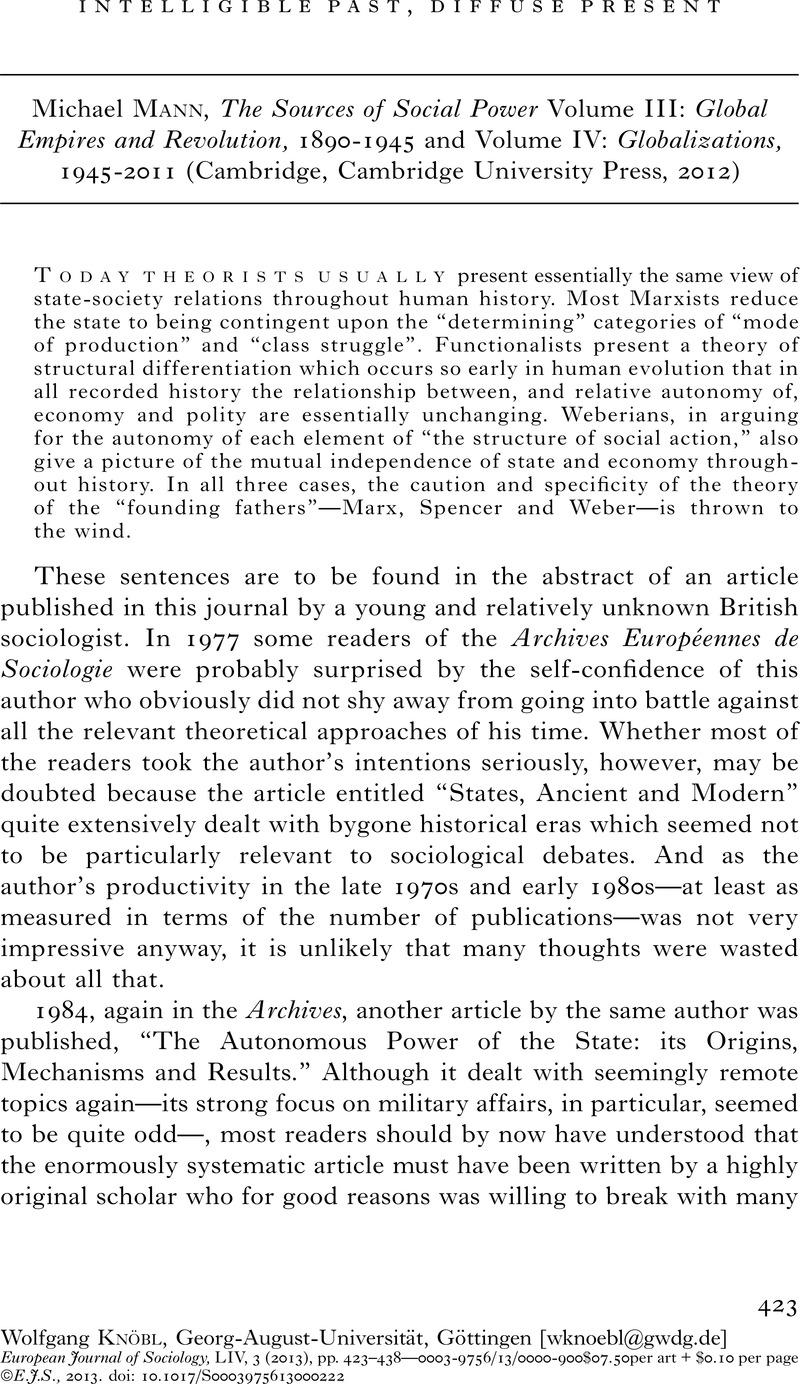Article contents
Intelligible Past, Diffuse Present - Michael Mann, The Sources of Social PowerVolume III: Global Empires and Revolution, 1890-1945 and Volume IV: Globalizations, 1945-2011 (Cambridge, Cambridge University Press, 2012)
Published online by Cambridge University Press: 22 January 2014
Abstract

- Type
- Review Symposium
- Information
- European Journal of Sociology / Archives Européennes de Sociologie , Volume 54 , Issue 3 , December 2013 , pp. 423 - 438
- Copyright
- Copyright © A.E.S. 2013
References
1 Michael Mann, The Sources of Social Power. Volume II: The rise of classes and nation-states, 1760-1914 (Cambridge, Cambridge University Press, 1993: 36).
2 Michael Mann, “The Sources of My Sources”, Contemporary Sociology, 42, (2013: 499).
3 Michael Mann, “The Sources of My Sources”: 501.
4 „Otto von Freising († 1158) lehrte, dass Herrschaft, Wissenschaft und Frömmigkeit von Ost nach West gewandert seien. Europa wurde zum Kulminationspunkt politischer, kultureller und religiöser Entfaltung. Von Babylon ausgehend folgten vier Weltreiche aufeinander, wanderten von Ost nach West bis zum letzten, dem Reich der Römer. Das römische Kaisertum gelangte an die Franken und dann an die Deutschen. Dieses Entwicklungsmodell des 12. Jhs. feierte den Westen als Ziel und Höhepunkt der Geschichte.” (Bernd Schneidmüller, Grenzerfahrung und monarchische Ordnung. Europa 1200-1500 [Munich, C.H. Beck, 2011: 16-17]).
5 Michael Mann, The Sources of Social Power. Volume I: A history of power from the beginning to A.D. 1760 (Cambridge, Cambridge University Press, 1986: 31).
6 Cf. the beautiful book by Karl Schlögel, Im Raume lesen wir die Zeit. Über Zivilisationsgeschichte und Geopolitik (Frankfurt/Main, Hanser, 2006).
7 His arguments were so persuasive that they are still used today even with respect to completely different historical and regional contexts (cf. James C., ScottThe Art of Not Being Governed. An Anarchist History of Upland Southeast Asia [New Haven and London, Yale University Press, 2009]).
8 Mann, The Sources, Volume I: 14.
9 Burbank Jane and Cooper Frederick, Empires in World History. Power and the Politics of Difference (Princeton, Princeton UP, 2010: 8).
10 Darwin John, The Empire Project. The Rise and Fall of the British World-System, 1830-1970 (Cambridge, Cambridge UP, 2009: 279).
11 Osterhammel Jürgen, Die Verwandlung der Welt. Eine Geschichte des 19. Jahrhunderts (Munich, C.H. Beck, 2009: 185).
12 Belich James, Replenishing the Earth. The Settler Revolution and the Rise of the Anglo-World, 1783-1939 (Oxford, Oxford UP, 2009); for an earlier, but regionally much more restricted study see Cronon William, Nature’s Metropolis. Chicago and the Great West (New York and London, W. W. Norton & Company, 1991).
13 Tooze Adam, “Empires at War”, New Left Review 79 (2013): 130f.
14 Cf. also the critical remarks by ToozeEmpires at War: 134f.
15 This somewhat incoherent interpretation of imperialism was also highlighted by other critics, cf. Dylan Riley, “Routes or Rivals? Social Citizenship, Capitalism, and War in the Twentieth Century”, Contemporary Sociology 42 (2013: 491).
16 Mark Mazower, Hitler’s Empire. Nazi Rule in Occupied Europe (London, Allen Lane, 2008); Timothy Snyder, Bloodlands. Europe between Hitler and Stalin (New York, Basic Books, 2010).
17 Cf. also Peter Wagner, „Provinz und Welt. Demokratie und Kapitalismus in Europa, Brasilien und Südafrika“, Westend. Neue Zeitschrift für Sozialforschung 10 (2013: 38-59).
18 Cf. the review of Volume III by Riley (Routes or Rivals?) who, coming from the left, was irritated by Mann’s slight-handed willingness to correlate capitalism and the advance of civil rights and to emphasize the readiness of societal elites to compromise with other classes.
- 1
- Cited by




